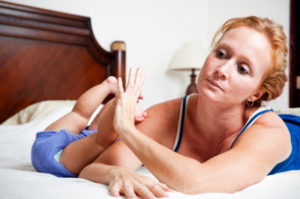Postpartum Depression is often not talked about. Studies are showing that up to 50%-80% of new mothers have some sort of emotional changes or mood swings postpartum, lasting up to 10 days post-delivery. Estimates of 10%-20% of women continue on to develop postpartum depression, which is depression that lasts longer than 10 days.
Surprisingly enough, most of the research has shown that hormonal changes are often not the cause of postpartum depression; rather it is the life changes after giving birth that tend to be the main reason for the development of this type of depression. This is why most anti-depressant intervention fails to provide relief for postpartum depression and it often not advised for nursing women.
Causes
More often postpartum depression is caused by physical changes, sleep deprivation, feeling overwhelmed, a loss of self-identity, financial problems and lack of support. There is no one cause for postpartum depression, though there are quite a few risk factors.
Risk factors include depression, pre-partum depression, having 2(+) abortions, history of obstetric complaints, severe PMS, being involved in a difficult relationship, lack of a support network, high stress levels, low socioeconomic status, unplanned/unwanted pregnancy, and infant problems such as colic.

Symptoms
Symptoms include, but are not limited to sadness, hopelessness, low self-esteem, feelings of being less loved, guilt, feeling overwhelmed, difficulty bonding (lack of concern) with the baby, sleep disturbances (insomnia or somnolence), eating disturbances (increased or decreased appetite), inability to be comforted, exhaustion, emptiness, inability to find pleasure in anything, social withdrawal, low or no energy, easily frustrated and irritable, easily angry, feelings of inadequacy, impaired speech and writing, anxiety (palpitations, worry, fear, hyperventilation, etc.), panic attacks, decreased sex drive, etc. Physical symptoms include: headaches, numbness, chest pain, hyperventilation, stomach aches, muscle aches, and back aches.
But there are different types of depression that occur postpartum. Baby Blues occurs 1-3 days after delivery, and there are mood changes, anxiety, sadness, irritability, crying, decreased concentration and trouble sleeping. Often these symptoms last approximately 10 days but can last up to several weeks.
Postpartum psychosis is far more rare, and while the symptoms are similar to postpartum depression they are generally far more severe and there can also be confusion, disorientation, hallucinations and delusions, paranoia, and in some cases attempts to harm oneself or the baby.
Treatment in Western Medicine
Often, medical intervention is the last resort as doctors find breast feeding is far more important. According to studies, there are no antidepressants that are fully safe for postpartum women. Some that are probably safe include Lorazepam/Ativan, Oxazepam/Serax, Paroxetine/Paxil, Sertraline/Zoloft, Trazodone, and Tricyclics (Elavil, Tofranil, Pamelor).
Drugs that should not be used to treat breast feeding women include long-acting Benzodiazepines (Librium, Valium, Dalmane), Citalopram/Celexa, Doxepin/Sinequan, Escitalopram/Lexapro, Fluoxetine (Prozac, Serafem), Lamotrigine/Lamictal, Lithium/Lithobid, Nefazodone/Serzone, Phenobarbital (anticonvulsant doses), Venlafaxine/Effexor, or Clozapine/Clozaril.
The best results from therapy occur from cognitive-behavioural therapy and the establishment of a good support system for the new mother, and early intervention is the key to keep the depression not only from progressing but also from impacting mother-child bonding. Mothers with long lasting postpartum depression have been shown to have children with behavioral problems, sleeping difficulties, eating difficulties, temper tantrums, hyperactivity and speech and language development delays.

Treatment in Chinese Medicine
According to Maciocia, “the exertion and loss of blood occurring at childbirth induces a state of Blood deficiency; since the Heart houses the Mind and governs the Blood, Heart-Blood becomes deficient, the mind has no residence and it becomes depressed and anxious… From Blood deficiency, other conditions may develop: after some time, and in women who have a predisposition to Yin deficiency, Blood deficiency may give rise to Yin deficiency and empty heat, causing a more severe condition of depression… Conditions of neurotic, obsessive, phobic or psychotic behaviour after childbirth are usually due to stagnant Blood harassing the Mind, rather than the more common Phlegm-Heat.

Herbs and Acupuncture are excellent adjuncts to providing a loving and caring support system.
Caroline Prodoehl, TCMP
References
Maciocia, Giovanni (1998). Obstetrics & Gynecology in Chinese Medicine. Churchill-Livingstone. NY, NY.
http://www.cmha.ca/mental_health/postpartum-depression/#.UYfRQ7Wkpkh
http://en.wikipedia.org/wiki/Postpartum_depression
http://www.babycenter.com/0_postpartum-depression-and-anxiety_227.bc#articlesection9
http://www.babycenter.com/0_drug-safety-during-breastfeeding_8790.bc
http://www.mayoclinic.com/health/postpartum-depression/DS00546

